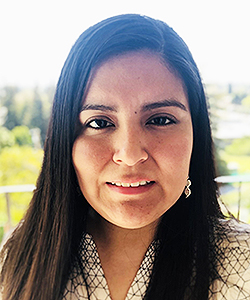 National Institutes of Health Fellowship, The Ruth L. Kirschstein Predoctoral Individual National Research Service Award
National Institutes of Health Fellowship, The Ruth L. Kirschstein Predoctoral Individual National Research Service Award
Betsabel Chicana Romero
What do you consider your hometown? What year are you and who is your advisor?
I was born in Lima, Peru, and I grew up in San Francisco. I’m a fifth-year graduate student in the Quantitative and Systems Biology Ph.D. program and my concentration is Molecular and Cell Biology and my advisor is Professor Jennifer Manilay. I expect to graduate in Spring 2022.
What does it mean to you to receive a National Institutes of Health Fellowship?
I found out my score for the award was listed as Impact Score: 14, Percentile: 5+. This is an amazing score, so I was ecstatic. However, it made the waiting for the award notification much harder. I had built up excitement, so when I finally got the award I was beyond happy.
Personally, it means that I'm on the right path professionally and I feel proud and fortunate. This award has made me reflect on my career and all the hard work I’ve done to get here and continue this path. To me, it is truly an honor to bring this award to UC Merced once again.
How much is the award and over how many years?
The Ruth L. Kirschstein Predoctoral Individual National Research Service Award comes with $36,901 for the first year and a potential $26,303 for a second year.
What attracted you to UC Merced for graduate school?
Two major factors attracted me to UC Merced: the diversity/campus climate and the strong support and opportunities.
In terms of the campus climate, the diversity of the campus was a huge consideration and factor for me when I was deciding to join. I’m a first-generation student and Latina, and I can relate to the students on our campus at a deeper level and understand their struggles. This made me feel welcomed and supported.
I selected UC Merced for graduate school to achieve my professional goals because of its interdisciplinary and collaborative attributes, especially in the Quantitative and Systems Biology program. There are opportunities for graduate students that are unique to this institution, such as offering our input for new faculty hiring and exclusively meeting with numerous speakers one-on-one, which helps build a professional network. UC Merced also has a supportive community of faculty, staff and other graduate students which encourages graduate students, such as me, to explore our potential. I took the rotation track and I found a great lab. Professor Manilay has been an amazing mentor.
What is your career plan after graduating with your Ph.D.?
My professional goal is to pursue a scientist career track where I can apply my scientific work experience and education in the biological sciences to help discover cures for diseases and novel therapies for patients. I will be starting to look for post-doctorate positions soon.



